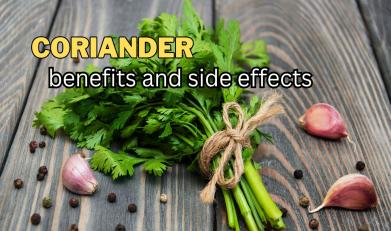

16 May, 2024
In the world of culinary delights and natural remedies, few herbs hold as much sway as coriander. Known for its distinctive aroma and versatile flavor, coriander, also called cilantro or Chinese parsley, is not just a culinary hero but also boasts an array of health benefits. However, like any potent ingredient, it's important to understand both its advantages and potential drawbacks. Let's delve into the green marvel that is coriander, exploring its benefits and side effects.
Rich in Nutrients: Coriander is a nutritional powerhouse, packed with vitamins, minerals, and antioxidants. It contains vitamins A, C, and K, as well as potassium, manganese, and folate, among others.
Digestive Aid: Coriander has been traditionally used to alleviate digestive issues like bloating, gas, and indigestion. Its essential oils may help stimulate digestive enzymes and promote healthy gut function.
Anti-inflammatory Properties: The antioxidants in coriander possess anti-inflammatory properties, which can help reduce inflammation throughout the body. This makes it potentially beneficial for conditions like arthritis and inflammatory bowel diseases.
Heart Health: Some studies suggest that coriander may help lower cholesterol levels and regulate blood pressure, thus promoting heart health. Its antioxidant properties may also protect against cardiovascular diseases.
Blood Sugar Control: Research indicates that coriander may have a hypoglycemic effect, helping to lower blood sugar levels. This could be beneficial for individuals with diabetes or those at risk of developing the condition.
Antimicrobial Effects: Coriander contains compounds that exhibit antimicrobial properties, which may help fight against certain bacteria and fungi. It can be used in food preservation and may also aid in treating infections.
Skin Benefits: Coriander's antioxidants and antimicrobial properties extend to skincare. It may help reduce acne, soothe skin irritations, and promote a clearer complexion when applied topically or consumed regularly.
Allergic Reactions: While rare, some individuals may be allergic to coriander. Allergic reactions can range from mild symptoms like skin rashes and itching to more severe reactions such as difficulty breathing or anaphylaxis.
Gastrointestinal Issues: Despite its digestive benefits for many, some people may experience gastrointestinal discomfort after consuming coriander. This could include symptoms like stomach pain, nausea, or diarrhea.
Interaction with Medications: Coriander supplements or extracts may interact with certain medications. Individuals taking blood thinners, anticoagulants, or medications for high blood pressure should exercise caution and consult with a healthcare professional before consuming coriander supplements regularly.
Cross-reactivity: Individuals allergic to certain plants, such as mugwort, may experience cross-reactivity with coriander, leading to allergic symptoms.
Skin Sensitivity: Direct contact with coriander or its essential oils may cause skin irritation or sensitivity in some individuals, especially those with sensitive skin or existing skin conditions.
Coriander is undeniably a remarkable herb, celebrated for its culinary versatility and health-promoting properties. From aiding digestion to fighting inflammation and supporting heart health, its benefits are vast. However, it's crucial to be mindful of potential side effects, particularly for those with allergies or sensitive digestive systems. As with any dietary supplement or herbal remedy, moderation and individual tolerance are key. By understanding both the benefits and risks, one can fully appreciate the green marvel that is coriander and harness its goodness in a safe and informed manner.